|
|
|
Sort Order |
|
|
|
Items / Page
|
|
|
|
|
|
|
| Srl | Item |
| 1 |
ID:
099088
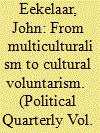

|
|
|
|
|
| Publication |
2010.
|
| Summary/Abstract |
In the context of the current debate on multiculturalism, this article draws on three models of state policies towards families to propose a reframing of multiculturalist policies. They are the 'authorisation' model, wherein the state authorises families to define and enforce family obligations as law; the 'delegation' model, wherein the state prescribes the norms families are to follow and delegates to families the role of enforcing them; and the 'purposive abstention' model, wherein the state uses the voluntary performance family norms as a tool of policy, giving them limited legal recognition within the continued application of the general law. The article considers how these models might guide policy towards communities, which can be seen, substantially, as collections of families. It favours the 'purposive abstention' model, which, in the context of cultural groups, could be termed 'cultural voluntarism'.
|
|
|
|
|
|
|
|
|
|
|
|
|
|
|
|
| 2 |
ID:
103671
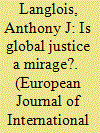

|
|
|
|
|
| Publication |
2011.
|
| Summary/Abstract |
Chandran Kukathas has argued that 'the political pursuit of global justice is not a worthy goal, and that our aims in establishing international legal and political institutions should be more modest'. In this article I will examine Kukathas's argument, and argue in turn that he is mistaken to decry the efforts of those who press for global justice. Despite Kukathas's professed support for international law and cosmopolitanism, and his concern about global inequality and other injustices, he argues that we should forswear the use of political power and political reform to secure the former or address the latter. Instead, Kukathas points us towards the possibility of a future global convergence on moral standards, which, despite being belied by his focus on human diversity, he seems to view as a prerequisite for political activity towards global justice. Kukathas is mistaken in his arguments about the relationship between power and justice, and this leads him to false conclusions about the role that political reform and political institutions should play in consideration of global injustice.
|
|
|
|
|
|
|
|
|
|
|
|
|
|
|
|
| 3 |
ID:
090133
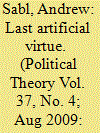

|
|
|
|
|
| Publication |
2009.
|
| Summary/Abstract |
David Hume's position on religion is, broadly speaking, "politic": instrumental and consequentialist. Religions should be tolerated or not according to their effects on political peace and order. Such theories of toleration are often rejected as immoral or unstable. The reading provided here responds by reading Hume's position as one of radically indirect consequentialism. While religious policy should serve consequentialist ends, making direct reference to those ends merely gives free reign to religious-political bigotry and faction. Toleration, like Hume's other "artificial virtues" (justice, fidelity to promises, allegiance to government), is a universally useful response to our universal partiality-as Established uniformity, however tempting, is not. This implies that toleration can progress through political learning, becoming broader and more constitutionally established over time. A sophisticated Humean approach thus shares the stability and normative attractiveness of respect- or rights-based arguments while responding more acutely and flexibly to problems the former often slights: antinomian religious extremism; underdefined political agency; and internationalized, politicized religious movements.
|
|
|
|
|
|
|
|
|
|
|
|
|
|
|
|
| 4 |
ID:
047381
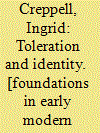

|
|
|
|
|
| Publication |
New York, Routledge, 2003.
|
| Description |
xi, 212p.
|
| Standard Number |
9780415933025
|
|
|
|
|
|
|
|
|
|
|
|
Copies: C:1/I:0,R:0,Q:0
Circulation
| Accession# | Call# | Current Location | Status | Policy | Location |
| 047084 | 179.9/CRE 047084 | Main | On Shelf | General | |
|
|
|
|
| 5 |
ID:
077227
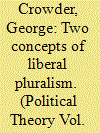

|
|
|
|
|
| Publication |
2007.
|
| Summary/Abstract |
Is the liberal state entitled to intervene in the internal affairs of its nonliberal minorities to promote individual autonomy as a public ideal, or should it tolerate the nonliberal practices of such groups in the name of legitimate diversity? This problem can be fruitfully approached from the perspective of Isaiah Berlin's notion of "value pluralism." According to William Galston, value pluralism privileges a form of liberalism that is maximally accommodating of nonliberal groups and their practices. I agree that pluralism fits best with a liberal political framework, but I depart from Galston's interpretation of what liberal pluralism involves. Taking value pluralism seriously, I argue, implies a form of liberalism in which personal autonomy is a central public ideal
|
|
|
|
|
|
|
|
|
|
|
|
|
|
|
|
| 6 |
ID:
001863
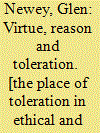

|
|
|
|
|
| Publication |
Edinburgh, The University Press, 1999.
|
| Description |
xx,208p.
|
| Standard Number |
9780748612444
|
|
|
|
|
|
|
|
|
|
|
|
Copies: C:1/I:0,R:0,Q:0
Circulation
| Accession# | Call# | Current Location | Status | Policy | Location |
| 042851 | 179.9/NEW 042851 | Main | On Shelf | General | |
|
|
|
|
| 7 |
ID:
184152
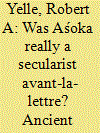

|
|
|
|
|
| Summary/Abstract |
Focusing on Rajeev Bhargava's claim that Aśoka was a secularist avant-la-lettre, I dispute the common understanding of secularism as the separation of religion and politics, and argue instead that such separation, to the extent that it existed, was characteristic of traditional religious societies. I then offer an alternative history of secularism as the demise of the traditional balance of power between church and state, and the rise of a unitary state which incorporated a civil religion that excluded competing forms of religiosity within its domain. This model of secularism, exemplified by the seventeenth-century English philosopher Thomas Hobbes, fits Aśoka's Dhamma better than the separationist model does.
|
|
|
|
|
|
|
|
|
|
|
|
|
|
|
|
|
|
|
|
|